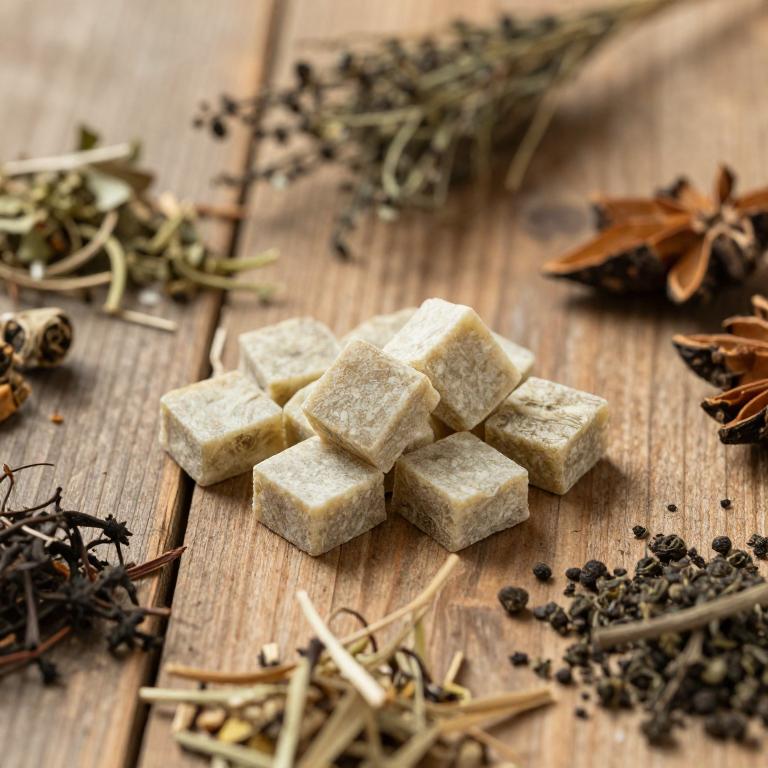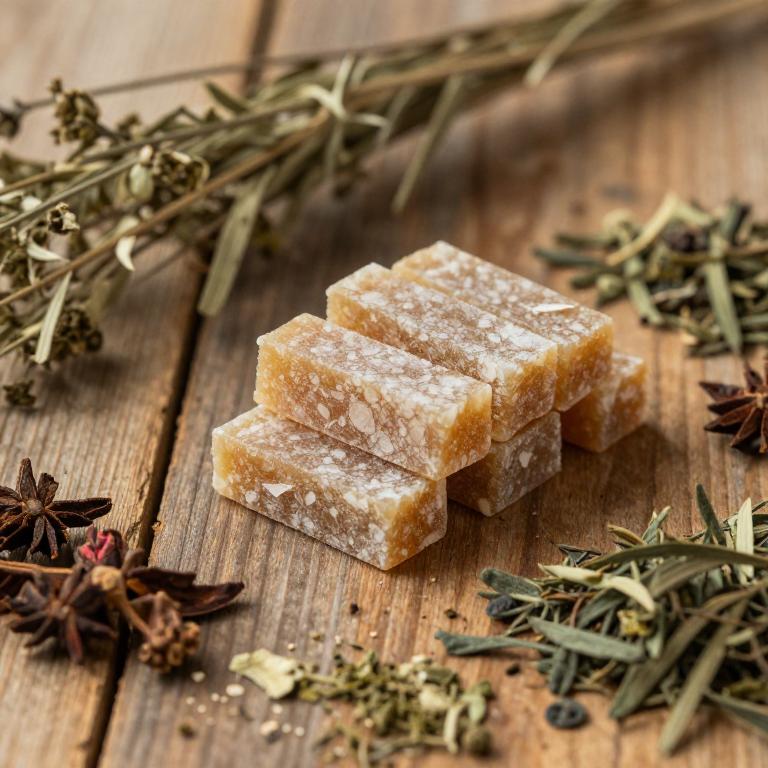10 Best Herbal Lozenges For Oral Thrush

Herbal lozenges are commonly used as a natural remedy for oral thrush, a fungal infection caused by Candida albicans.
These lozenges often contain antifungal herbs such as echinacea, goldenseal, and sage, which are believed to help reduce fungal overgrowth in the mouth. They work by soothing sore tissues, reducing inflammation, and providing a local antifungal effect. While they may offer relief from symptoms, they are generally considered complementary rather than a primary treatment for oral thrush.
It is important to consult a healthcare provider for proper diagnosis and to determine the most appropriate treatment, especially if symptoms persist or worsen.
Table of Contents
- 1. Licorice (Glycyrrhiza glabra)
- 2. Ginger (Zingiber officinale)
- 3. Ceylon cinnamon (Cinnamomum verum)
- 4. Echinacea (Echinacea purpurea)
- 5. Salvia (Salvia officinalis)
- 6. Aloe vera (Aloe barbadensis)
- 7. Purple coneflower (Echinacea angustifolia)
- 8. Thyme (Thymus vulgaris)
- 9. Stinging nettle (Urtica dioica)
- 10. Chaste tree (Vitex agnus-castus)
1. Licorice (Glycyrrhiza glabra)

Glycyrrhiza glabra, commonly known as licorice root, is often used in herbal lozenges to alleviate symptoms of oral thrush, a fungal infection caused by Candida albicans.
These lozenges contain glycyrrhizin, a compound with antifungal and anti-inflammatory properties that may help reduce the growth of Candida in the oral cavity. The soothing effect of licorice root can also provide relief from the discomfort associated with thrush, such as soreness and burning sensations. While licorice lozenges are not a substitute for antifungal medications, they may serve as a complementary therapy to support healing and comfort.
However, individuals with hypertension or those taking corticosteroids should use licorice root cautiously, as it may have potential side effects.
2. Ginger (Zingiber officinale)

Zingiber officinale, commonly known as ginger, has been traditionally used for its antimicrobial and anti-inflammatory properties, making it a potential natural remedy for oral thrush.
Ginger herbal lozenges may help alleviate symptoms by reducing fungal overgrowth in the mouth due to their bioactive compounds such as gingerol and shogaol. These lozenges can soothe sore throat and irritation associated with oral thrush while supporting the body's natural defenses against infection. However, they should be used as a complementary therapy alongside antifungal treatments prescribed by a healthcare provider.
It is important to consult a medical professional before using ginger lozenges, especially for individuals with known allergies or underlying health conditions.
3. Ceylon cinnamon (Cinnamomum verum)

Cinnamomum verum, commonly known as true cinnamon, has been traditionally used for its antimicrobial and antifungal properties, making it a potential natural remedy for oral thrush.
Herbal lozenges containing Cinnamomum verum may help reduce the symptoms of oral thrush by inhibiting the growth of Candida albicans, the primary fungal agent responsible for the infection. These lozenges are often preferred for their soothing effect on sore throat and their pleasant cinnamon flavor, which can make the treatment more palatable. While they may offer relief, they should not replace medical treatment for severe or persistent cases.
It is advisable to consult a healthcare professional before using cinnamon lozenges, especially for individuals with allergies or underlying health conditions.
4. Echinacea (Echinacea purpurea)

Echinacea purpurea herbal lozenges are commonly used as a natural remedy to support the body's immune response and potentially alleviate symptoms of oral thrush, a fungal infection caused by Candida albicans.
These lozenges contain the active components of the echinacea plant, which are believed to have antimicrobial and anti-inflammatory properties that may help combat the fungal overgrowth in the mouth. While some studies suggest that echinacea may reduce the duration and severity of oral thrush, more research is needed to confirm its efficacy as a primary treatment. It is often recommended as a complementary therapy alongside conventional antifungal treatments, under the guidance of a healthcare professional.
However, individuals with allergies to plants in the daisy family should exercise caution when using echinacea-based products.
5. Salvia (Salvia officinalis)

Salvia officinalis, commonly known as sage, is often used in herbal lozenges to help manage symptoms of oral thrush, a fungal infection caused by Candida albicans.
These lozenges work by leveraging sage’s antimicrobial and anti-inflammatory properties, which can help reduce fungal overgrowth and soothe inflamed oral tissues. The essential oils in sage, such as thujone and camphor, contribute to its antifungal effects, making it a natural alternative for those seeking non-pharmaceutical treatments. While sage lozenges may provide relief, they should not replace professional medical advice, especially for severe or persistent cases.
As with any herbal remedy, it is important to consult a healthcare provider before use, particularly for individuals with underlying health conditions or those taking other medications.
6. Aloe vera (Aloe barbadensis)

Aloe barbadensis herbal lozenges are a natural remedy commonly used to alleviate the symptoms of oral thrush, a fungal infection caused by Candida albicans.
These lozenges contain aloe vera, which has antimicrobial and anti-inflammatory properties that can help reduce inflammation and soothe the painful sores associated with the condition. The soothing gel-like consistency of aloe vera can also provide a protective barrier over the affected areas in the mouth, promoting healing. While they may not replace antifungal medications, aloe barbadensis lozenges can be a complementary treatment for individuals seeking a gentle, alternative approach.
However, it is important to consult a healthcare provider to ensure proper diagnosis and treatment, especially if symptoms persist or worsen.
7. Purple coneflower (Echinacea angustifolia)

Echinacea angustifolia herbal lozenges are commonly used as a natural remedy to support the treatment of oral thrush, a fungal infection caused by Candida species.
These lozenges contain standardized extracts of Echinacea angustifolia, which are known for their antimicrobial and immune-boosting properties. By reducing inflammation and inhibiting the growth of Candida, these lozenges may help alleviate symptoms such as soreness and white patches in the mouth. They are often preferred by individuals seeking alternative or complementary therapies to conventional antifungal treatments.
However, it is important to consult a healthcare provider before using echinacea lozenges, especially for those with allergies or underlying health conditions.
8. Thyme (Thymus vulgaris)

Thymus vulgaris, commonly known as thyme, is a popular herbal ingredient used in the formulation of lozenges for the treatment of oral thrush, a fungal infection caused by Candida species.
These lozenges are designed to provide localized antifungal action by leveraging the natural compounds in thyme, such as thymol, which exhibit strong antimicrobial properties. Thymus vulgaris lozenges are often preferred as a natural alternative to conventional antifungal medications, particularly for individuals seeking complementary or alternative therapies. They are typically used to alleviate symptoms such as soreness, white patches, and discomfort in the mouth associated with oral thrush.
However, it is important to consult a healthcare professional before using these lozenges, especially if the infection persists or worsens, to ensure proper diagnosis and treatment.
9. Stinging nettle (Urtica dioica)

Urtica dioica, commonly known as stinging nettle, is a herbal remedy that has been used traditionally for its anti-inflammatory and antimicrobial properties.
Urtica dioica herbal lozenges are formulated to target oral thrush, a fungal infection caused by Candida albicans, by providing soothing relief and potentially inhibiting fungal growth. These lozenges may help reduce inflammation and discomfort in the throat and mouth, making them a natural alternative for individuals seeking non-antibiotic treatments. While they are not a substitute for medical advice, they can be used as a complementary therapy under the guidance of a healthcare professional.
However, it is important to consult a physician before using these lozenges, especially for individuals with underlying health conditions or those taking other medications.
10. Chaste tree (Vitex agnus-castus)

Vitex agnus-castus, also known as chasteberry, is a herbal remedy that has been traditionally used to support hormonal balance and may help alleviate symptoms associated with oral thrush by reducing inflammation and promoting healing in the oral cavity.
Herbal lozenges containing Vitex agnus-castus are often formulated to provide a soothing effect, making them a natural alternative for those seeking relief from the discomfort of oral thrush. These lozenges work by supporting the body's immune response and may help in reducing the overgrowth of Candida fungi, which is a common cause of oral thrush. While they are not a substitute for antifungal medications, they can be used as a complementary therapy under the guidance of a healthcare professional.
It is important to consult with a qualified practitioner before using Vitex agnus-castus lozenges, especially for individuals with underlying health conditions or those taking other medications.